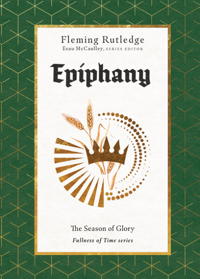
As the season of Christmas draws to a close, we're pleased to share an excerpt from the beginning of Epiphany: The Season of Glory from the Fullness of Time series. In this short volume, priest and theologian Fleming Rutledge expounds the primary biblical texts and narrative arc of the season, inviting us to discover anew "the glory of God in the face of Jesus Christ." If you find yourself intrigued by this exploration, check out her book at InterVarsity Press.
adapted from the introduction:
The church calendar can be a powerful aid to growth in faith and service. The rhythm of the seasons, the repetition of the sequence year after year despite outward circumstances, the variety and richness of the Scripture readings, and, most of all, the story that the seasons tell in narrative progression throughout the year — all of this can be powerful for the nourishment of growth in grace. Thus we may say that the calendar is edifying — providing instruction, guidance, and inspiration for the upbuilding of the church.
But above all, the church year leads us to Jesus Christ. The progression of seasons, when all is said and done, is designed so that the members of Christ’s body may participate even now in his eternal life by rejoicing in his living presence, following him in our various vocations, enacting his teachings in our ministries, knowing him as our Savior, and above all glorifying him as Lord. In our time, however, many of the very same mainline churches who show a new interest in the church seasons have grown weak in proclaiming Christ. It does not give me any pleasure to note this. Jesus of Nazareth is revered as a teacher and moral exemplar, not infrequently side by side with various other religious figures, but the apostolic message about the unique identity and destiny of the Messiah (Christos) has become attenuated. As for the so called evangelical, conservative, or right-wing churches, they have often allowed Jesus to become a repository of various grievances, so that the invocation of his name at political rallies has become commonplace. When something or someone less than God in Jesus Christ is evoked in worship, the central focus of the apostolic message is obscured, if not negated outright.
 The good news that the Scriptures proclaim will not thrive in this theological crisis. Serious attention paid to the themes of the season following the Feast of the Epiphany, in particular, can be a strong antidote to a weak Christology. To be sure, all of the church calendar is formed around Jesus, but there is a sense in which Epiphany is the most specifically christological season. The lectionary readings for Epiphany are chosen and arranged in an order designed to glorify him. When the season is preached and taught with this in mind, there can be no doubt — for those who have ears to hear — as to who Jesus is and what he has been born to accomplish. There are particular events from Christ’s life that have been part of Epiphany for two millennia — events that specifically elevate him as Savior and Lord.
The good news that the Scriptures proclaim will not thrive in this theological crisis. Serious attention paid to the themes of the season following the Feast of the Epiphany, in particular, can be a strong antidote to a weak Christology. To be sure, all of the church calendar is formed around Jesus, but there is a sense in which Epiphany is the most specifically christological season. The lectionary readings for Epiphany are chosen and arranged in an order designed to glorify him. When the season is preached and taught with this in mind, there can be no doubt — for those who have ears to hear — as to who Jesus is and what he has been born to accomplish. There are particular events from Christ’s life that have been part of Epiphany for two millennia — events that specifically elevate him as Savior and Lord.
Because of this, the season needs to be brought into the foreground along with Christmas. If the season of Epiphany were to be strongly presented as a central, cohesive narrative during the winter months by clergy, teachers, and other leaders, it would make a powerful impression. Lent gets more attention, and for good reason, but Epiphany can excel in theological and narrative power if it is forcefully shaped, preached, and taught. If those who shape worship in local congregations took seriously the opportunity to manifest the identity, mission, and, yes, the glory of Christ as Epiphany unfolds, it could be a transformative season of growth in faith. It is not for nothing that the season has been associated with mission and growth— with the spread of the gospel.
The season of Epiphany always begins on January 6 (the Feast of the Epiphany) and extends until Ash Wednesday, the beginning of Lent. Ash Wednesday’s date is determined by the date of Easter, so Epiphany is much shorter in some years than in others. This may have something to do with its comparative neglect in the church. Despite its beauty and depth, it is arguably the least understood and least appreciated of all the seasons. We know Advent, or think we do, because it comes just before Christmas — a fact which, for better and worse, has shaped the season. We know that Lent means the cross, and Easter means the empty tomb. Pentecost means the descent of the Spirit. Epiphany means . . . what, exactly? Epiphaneia in New Testament Greek means manifestation. An effective method of teaching the content of the faith, not often enough used, is to instruct congregations in the texts of the seasonal hymns.
In biblical faith, knowledge of the true God is not attainable by human effort. We cannot summon up the presence of the living Jesus by efforts of our own, however “spiritual”; his presence is his to give. Any manifestation that reveals Jesus’ true identity occurs because the power of God is at work upon the eyes, ears, and hearts of the recipients. The unfolding of the Epiphany season is therefore a record of God’s definitive and unique actions in the One who has been born in Bethlehem.
The fulness of the incarnation that has taken place will be manifested in various ways during the Epiphany season — and climactically in Lent and Easter soon to follow. The themes of Epiphany can be powerfully preached and taught for the health and growth of the church. They are revelatory themes, suitable to the overall motif of manifestation or showing forth — the basic definition of epiphaneia in New Testament Greek.
Adapted from Epiphany by Fleming Rutledge. ©2023 by Fleming Rutledge. Used by permission of InterVarsity Press. www.ivpress.com.
Photo by Stephen Rahn on StockSnap